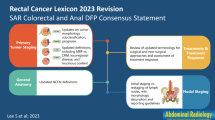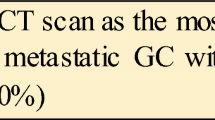Abstract
Purpose
From 1991 to 1994 we performed a phase II study with intensive preoperative chemoradiation in locally advanced squamous cell carcinoma and adenocarcinoma of the esophagus. We now report on a multivariate analysis of prognostic factors based on the long-term results at a median follow-up of 6.5 years.
Patients and methods
Eighty-eight patients were treated. Prognostic factors for overall survival and local tumor control were identified by univariate and multivariate analysis.
Results
Median overall survival reached 17 months, and the survival rate at 5 years was 22% (95%-confidence interval: 18–26%). Response to induction chemotherapy was the only independent factor predicting local tumor control and—beside weight loss prior to treatment—it also proved to be an independent prognostic factor for long-term survival.
Conclusions
Intensive chemoradiation followed by surgery seems to be appropriate to improve long-term survival of high-risk patients with locally advanced esophageal cancer. In our trial, local tumor control and prognosis were best correlated with response to induction chemotherapy. These results may help to guide decisions regarding surgery in multimodal treatment of EC. Further efforts are needed to increase the number of treatment responders and to predict tumors not responding to chemo(radio)therapy earlier.


Similar content being viewed by others
References
Killinger WA, Rice TW, Adelstein DJ, Medendorp SV, et al (1996) Stage II esophageal carcinoma: the significance of T and N. J Thorac Cardiovasc Surg 111:935–940
Siewert JR, Stein H, Feith M, et al (2001) Histologic tumor type is an independent prognostic parameter in esophageal cancer. Lessons from more than 1,000 consecutive resections at a single center in the Western world. Ann Surg 234:360–369
Urschel JD, Vasan H (2003) A meta-analysis of randomized controlled trials that compared neoadjuvant chemoradiation and surgery alone for resectable esophageal cancer. Am J Surg 185:538–543
Stahl M, Wilke H, Fink U, Stuschke M, et al (1996) Combined preoperative chemotherapy and radiotherapy in patients with locally advanced esophageal cancer: interim analysis of a phase II trial. J Clin Oncol 14:829–837
Hermanek P, Sobin LH, UICC (1992) TNM Classification of Malignant Tumors. 4th edn., 2nd revision. Springer, Berlin Heidelberg New York
Mantel N (1966) Evaluation of survival data and two new rank order statistics arising in its consideration. Cancer Chemother Rep 50:163–170
Cox DR (1972) Regression models and life tables (with discussion). J R Stat Soc B 34:187–220
Sugimachi K (1998) Advances in the surgical treatment of oesophageal cancer. Br J Surg 85:298–290
Siewert JR, Feith M, Werner M, et al (2000) Adenocarcinoma of the esophagogastric junction. Results of surgical therapy based on an anatomical/topographic classification in 1,002 consecutive patients. Ann Surg 232:353–261
Geh JI, Crellin AM, Glynne-Jones R (2001) Preoperative (neoadjuvant) chemoradiotherapy in oesophageal cancer. Br J Surg 88:338–356
Slater MS, Holland J, Faigel DO, et al (2001) Does neoadjuvant chemoradiation downstage esophageal carcinoma? Am J Surg 181:440–444
Peters JH, Hoeft SF, Heimbucher J, et al (1994) Selection of patients for curative or palliative resection of esophageal cancer based on preoperative endoscopic ultrasonography. Arch Surg 129:534–539
Alexander EP, Lipman T, Harmon J, et al (2000) Aggressive multimodality therapy for stage III esophageal cancer: a phase I/II study. Ann Thorac Surg 69:363–368
Adelstein DJ, Rice TW, Rybicki LA, et al (2000) Does paclitaxel improve the chemoradiotherapy of locoregionally advanced esophageal cancer? A nonrandomized comparison with fluorouracil-based therapy. J Clin Oncol 18:2032–2039
Ajani JA, Komaki R, Putnam JB, et al (2001) A three-step strategy of induction chemotherapy then chemoradiation followed by surgery in patients with potentially resectable carcinoma of the oesophagus or gastroesophageal junction. Cancer 92:279–286
Putnam JB, Suell DM, McMurtrey MJ, et al (1994) Comparison of three techniques of oesophagectomy within a residency training program. Ann Thorac Surg 57:319–325
Bosset JF, Gignoux M, Triboulet JP, et al (1997) Chemoradiotherapy followed by surgery compared with surgery alone in squamous-cell cancer of the oesophagus. N Engl J Med 337:161–167
Walsh TN, Noonan N, Hollywood D, et al (1996) A comparison of multimodal therapy and surgery for esohageal adenocarcinoma. N Engl J Med 335:462–467
Stahl M, Wilke H, Walz MK, et al (2003) Randomized phase III trial in locally advanced squamous cell carcinoma of the esophagus: chemoradiation with and without surgery. Proc ASCO 22:250 [abstr]
Bedenne L, Michel P, Bouche O, et al (2002) Randomized phase III trial in locally advanced esophageal cancer: radiochemotherapy followed by surgery versus radiochemotherapy alone (FFCD 9102). Proc ASCO 21:130 [abstr]
Acknowledgement
We gratefully thank I. Hawig (West German Cancer Centre, University of Essen) for data management and statistical workup and K. Renzing-Köhler (Institute for Statistics and Biometry, University of Essen) for preparing the multivariate analysis of the data
Author information
Authors and Affiliations
Corresponding author
Rights and permissions
About this article
Cite this article
Stahl, M., Wilke, H., Stuschke, M. et al. Clinical response to induction chemotherapy predicts local control and long-term survival in multimodal treatment of patients with locally advanced esophageal cancer. J Cancer Res Clin Oncol 131, 67–72 (2005). https://doi.org/10.1007/s00432-004-0604-5
Received:
Accepted:
Published:
Issue Date:
DOI: https://doi.org/10.1007/s00432-004-0604-5




